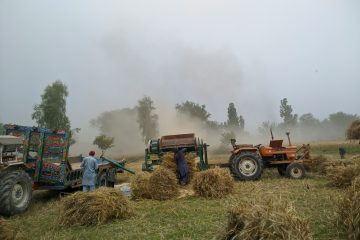It’s important to note that agricultural income in Pakistan is generally exempt from federal income tax. This means any income earned from agricultural activities is not subject to taxes collected by the federal government. The tax on agricultural income, as defined by the Punjab Agricultural Income Tax Act, is collected by the respective provincial government. This revenue remains within the province for its development purposes. This article explores the tax levied on agricultural income in the province of Punjab. It highlights the tax rates, applicability, and how it differs from the federal tax structure.
Tax Rates on Agricultural Income in Punjab
The Punjab Agricultural Income Tax Act, 1997, outlines a tiered tax system for agricultural income. Here’s a breakdown of the agricultural income tax rates in Punjab applicable from November 28, 2024:
| Total Agricultural Income (Rs.) | Tax Rate / Amount |
|---|---|
| Up to 400,000 | 0% (Exempt) |
| 400,001 – 800,000 | Rs. 1,000 |
| 800,001 – 1,200,000 | Rs. 2,000 |
| 1,200,001 – 2,400,000 | 5% of the amount exceeding Rs. 1,200,000 |
| 2,400,001 – 4,800,000 | Rs. 60,000 + 10% of the amount exceeding Rs. 2,400,000 |
| Above 4,800,000 | Rs. 300,000 + 15% of the amount exceeding Rs. 4,800,000 |
These tax rates are specific to Punjab province and apply to agricultural income generated within its borders. Other provinces in Pakistan have their own agricultural income tax structures.
Penalties and Fines
The amendments to the Punjab Agricultural Income Tax Act introduce stricter penalties for failing to submit tax statements on time and increase the surcharge for late tax payments. Previously, the penalty for late submission was a flat Rs. 25 per day, capped at Rs. 1,000. Now, it is either 0.1% of the tax due per day or Rs. 1,000 per day, with minimum penalties set at Rs. 10,000 for incomes up to Rs. 1.2 million, Rs. 20,000 for incomes between Rs. 1.2 million and Rs. 40 million, and Rs. 50,000 for incomes above Rs. 40 million. Additionally, the default surcharge for non-payment or delayed payment of tax has increased from 5% per annum to the higher of either 12% or KIBOR plus 3%. These changes aim to enforce tax compliance more strictly by imposing heavier financial consequences for delays and defaults.
Beyond Punjab
If you earn income through agriculture in other parts of Pakkistan, it’s essential to understand the tax laws of the province where your agricultural land is situated. Here’s a province-wise breakdown of agricultural income tax rules in Pakistan:
- In Sindh, agricultural income up to Rs. 600,000 annually is tax-free. However, if your income exceeds Rs. 600,000, it becomes taxable under the Sindh agricultural tax rules. The Sindh Revenue Board provides detailed tax slabs and rates for agricultural landowners and tenants.
- In Khyber Pakhtunkhwa, the exemption also applies to annual agricultural income up to Rs. 600,000. For income exceeding Rs. 600,000, provincial tax is levied based on the KPK agricultural income tax slabs, as outlined by the KPK Revenue Authority.
In Conclusion
The taxation of agricultural income in Pakistan follows a decentralized approach. While the federal government exempts agricultural income from tax, provinces like Punjab have their own tax structures specifically designed for this income source. This system allows provinces to generate revenue from their agricultural sector and utilize it for their own development initiatives.


